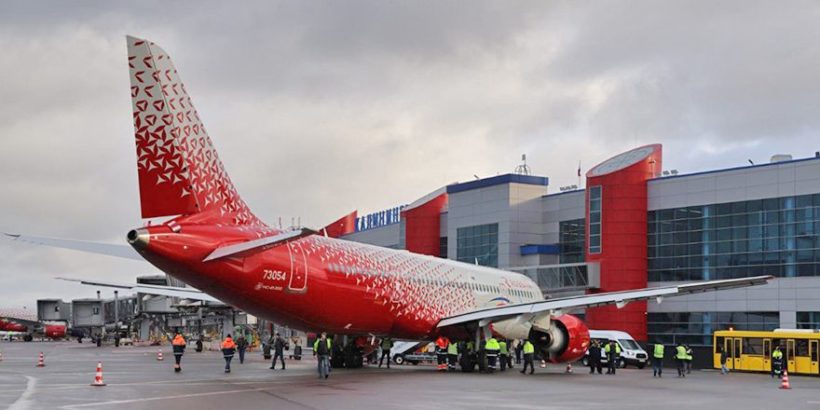Sergey Chemezov, CEO of Rostec State Corporation, said in an interview with RIA Novosti on January 27 that the MC-21 has reached the finish line.
«The MC-21 programme is actually at the finish line today. We have solved the engine problem, the «black wing» problem. We have received approval from Rosaviation of the main changes in the standard design related to the installation of the PD-14 and the wing made of domestic composites,» Mr Chemezov said.
However, it is still a little premature to talk about the finish line at the beginning of 2023, firstly because the finish line is scheduled for the end of 2024 and secondly because of the enormous amount of work and testing that still needs to be done. The head of Rostec also said that: «We plan to start testing other systems as part of the aircraft in 2023, so that by the end of 2024 we can certify a fully Russian aircraft and start serial production. Some of these systems are already being bench-tested.»
So, what does it take for the MC-21 to start commercial operations in two years?
In 2023, the 73361 will be modified into the MC-21-310rus version, which is a design with completely domestic components: the PD-14 engine, Russian avionics, and Russian aircraft systems and assemblies. Flight certification tests on it are scheduled to begin by the end of the year to obtain the main change to the type certificate.
The 73055 prototype will be partly fitted with Russian components. Perm engineers are currently replacing the engines on it. The first flight was made on December 15, 2020, PD-14 engines, which worked two years, will be transported to Perm, where they will be tested by specialists of ODK-PM, and the new engines have already been delivered to Zhukovsky — to be installed on the aircraft.
By the end of 2023, aircraft 73051, 73055 and 73361 will be involved in the flight test programme of domestic equipment. Aircraft 73051 will also be used as part of lightning protection testing, while aircraft 73056 will undergo aircraft emergency abandonment testing and ground testing of new domestic equipment.
The 73053 aircraft will be used to test the avionics and test the automatic control system algorithms to ensure a lowering of the weather minima.
The 73054 will be used as a transport and for training. The machine is fully compliant with the type certificate and nothing can be changed on this aircraft, otherwise it would be legally impossible to train a civil pilot on it. It is not necessary to expect a large number of flights of this aircraft, as its life will be required for the training of instructor pilots and civil pilots. On the 4th of January the aircraft flew to Ulyanovsk, where the Aviastar plant was visited by Vice Prime Minister, Minister of Industry and Trade Denis Manturov and delegation of aviation industry, including Director General of UAC Yuri Slyusar.
Ground and flight tests are currently underway at the Yakovlev design bureau’s R&D facility in Zhukovsky. In January, 73051, 73053 and 73054 flew in the air.
For example, on January 10, 73051 prototype aircraft performed a flight lasting 3 hours and 50 minutes, during which the actual thrust of the PD-14 engines was determined on fixed operating conditions. This was necessary to clarify the planned flight schedules for January 26 and 27. On those days, the aircraft flew to and from the Omsk region to determine the optimum flight parameters for take-off with the maximum permissible mass.

The minimum cost of SSJ-New aircraft for Aeroflot group will be RUB 2.256 billion, the first MC-21 and Tu-214 — RUB 3.144 billion. This follows from the investment project for preferential leasing of Russian aircraft, which was approved by Prime Minister Mikhail Mishustin on 11 January.
The project provides for the construction of 63 aircraft, including 18 MC-21, 34 SSJ-New and 11 Tu-214 from 2022 to 2025. Acceptance and delivery of the first six MC-21-310 aircraft to the Aeroflot group will take place in December 2024-January 2025.
* * *
The Irkutsk Aviation Plant is currently implementing the program of increasing series production of the MC-21 passenger aircraft, with the target production rate of 72 planes per year to be reached by 2027. The company expects to hire approximately 4,500 specialists within five years to accomplish these objectives, as well as to expand the mechanical, aggregate, and assembly, and other production facilities.
* * *
The Research Institute for Physical Measurements of the Russian Space Systems holding has developed sensors and conversion equipment for the MC-21 aircraft. NIIFI sensors will replace imported devices in the aircraft’s landing gear temperature control system and air conditioning system.
* * *
The Navigator Institute of Aviation Instrument Engineering has completed ground and flight tests of the Traffic Collision Avoidance System (TCAS) designed for installation on Russian civil aircraft. At present, the TCAS is being qualified and the certificate of eligibility for the component is being issued.
The Yakovlev Design Bureau told the website Russian Aviation, they have not yet installed the domestic TCAS on the MC-21 prototypes. At the same time, it can be received by aircraft 73361, which is being modified into a fully russified version at the Irkutsk aircraft plant.
